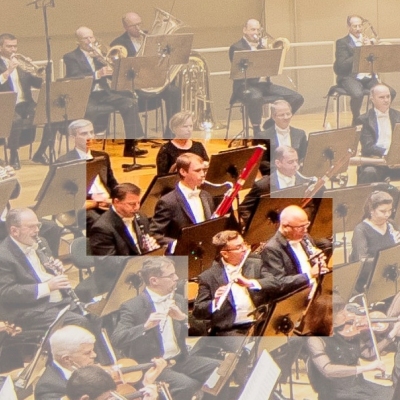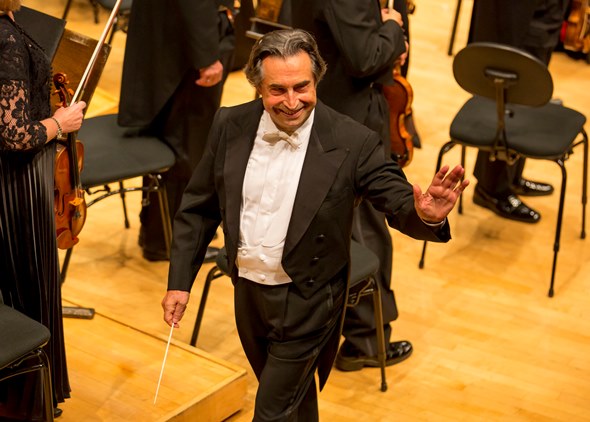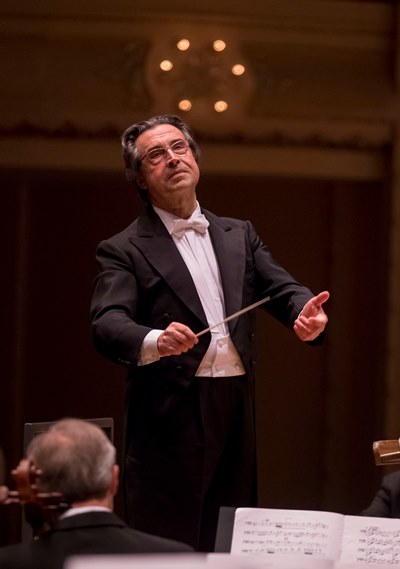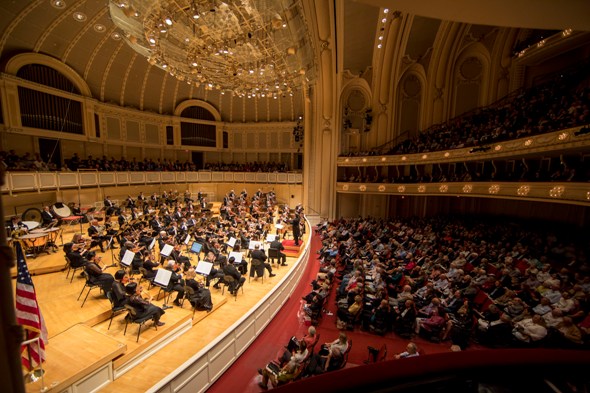Riccardo Muti, CSO and Bruckner: The sequel delivers a radiant view of Seventh Symphony
Review: Chicago Symphony Orchestra conducted by Riccardo Muti, at Orchestra Hall through Sept. 27
By Lawrence B. Johnson
Picking up right where they left off at the end of last season, with glorious Bruckner, the Chicago Symphony Orchestra and music director Riccardo Muti opened their 2016-17 series Sept. 22 by illuminating the sonorous towers and spiritual depths of the Seventh Symphony.
Much as he had done with Bruckner’s valedictory Ninth Symphony last spring, Muti unfurled the Seventh with patient indulgence in its pervasive lyricism, finely threaded woodwind writing and splendorous sunbursts by the work’s mighty force of horns and brasses. The Chicago virtuosi responded in mid-season form with a performance no less thrilling in its delicacy than in its grandeur.
 After a drawn-out period in flux, the CSO finally has a settled quartet of wind principals: flutist Stefán Ragnar Höskuldsson, oboist Alex Klein, clarinetist Stephen Williamson and bassoonist Keith Buncke. Bruckner’s richly hued symphony profited immensely from the technical finesse and expressive ensemble quality of these four superb musicians. The foursome could scarcely have enjoyed a more telling showcase than the slow movement of the Bruckner Seventh, with its ethereal interplay of the solo winds.
After a drawn-out period in flux, the CSO finally has a settled quartet of wind principals: flutist Stefán Ragnar Höskuldsson, oboist Alex Klein, clarinetist Stephen Williamson and bassoonist Keith Buncke. Bruckner’s richly hued symphony profited immensely from the technical finesse and expressive ensemble quality of these four superb musicians. The foursome could scarcely have enjoyed a more telling showcase than the slow movement of the Bruckner Seventh, with its ethereal interplay of the solo winds.
From its premiere by the Leipzig Gewandhaus Orchestra in 1884, the Seventh Symphony has sustained a popularity among Bruckner’s epic works matched only by the Fourth. The two works share not only abundant lyricism and sure-handed narrative structure, but also a gemütlich appeal that seems to come straight from the heart of a modest composer sprung from the Austrian soil.
All of these essential qualities Muti captured in an account that no less honored the distinctly Wagnerian persona that courses through the Seventh Symphony. Bruckner may have been Wagner’s all-time champion admirer, and this symphony resonates with the latter’s harmonic and coloristic influences – down to the use of four so-called Wagner tubas that augment five French horns in Bruckner’s ample orchestration.
It’s a tricky challenge to find the balance between the stunning bursts of sheer sonorous power called for at points throughout the Seventh Symphony and the breathtaking finesse – the spiritual radiance — that actually forms the heart of the work. This Muti achieved precisely and utterly in delivering a Seventh that sparkled and sang, that rose heavenward on gossamer wings even amid the peal of divine trumpets.
Bruckner’s 65-minute symphony filled the second half of a concert that already had satisfied the price of a ticket before intermission.
Indeed, the CSO’s luxurious turn through Strauss’ “Don Juan” lacked only length to claim rewards commensurate with the Bruckner. This was not music of soulful ascendancy but of earthly passion, in the fullness of its surge and flow, its heat and release. As in the Bruckner, the CSO strings shaped and buoyed this feverish love story with subtle inflection and burnished sound.
The Strauss also benefited from something of a coda to the CSO career of principal trumpet Christopher Martin, who has modulated to the New York Philharmonic effective, well, almost immediately. But Martin has stayed on for Muti’s autumn weeks here, and his crisp, bright production smartly enhanced “Don Juan.”
Muti opened his program with another blazer: “A Night on Bald Mountain,” a showpiece for orchestra nominally by Mussorgsky but in truth substantially the work of that master orchestrator Rimsky-Korsakov. Muti led the band on a wild night ride filled with ghostly images and ghastly frights. One half expected a pumpkin head to come flying from the stage. The piece may have gained a reputation as pops fare, but in the hands of Muti’s ghoulish gang, it was bloody electric.
Related links:
- CSO 2016-17 season preview: Go to CSO Sounds and Stories
- CSO season calendar: Go to cso.org
Tags: Alex Klein, Chicago Symphony, Keith Buncke, Riccardo Muti, Stefán Ragnar Höskuldsson, Stephen Williamson




